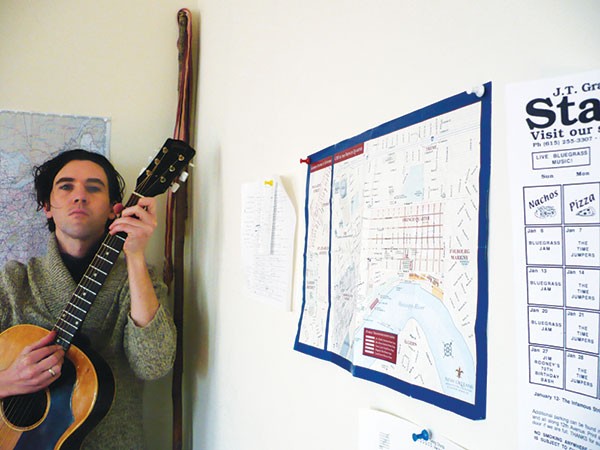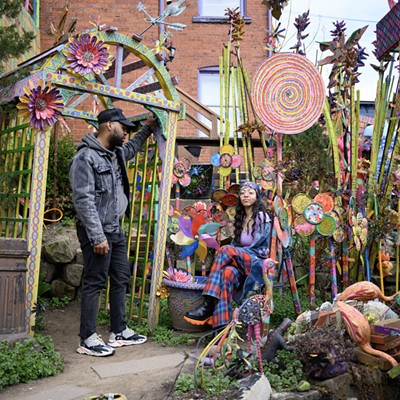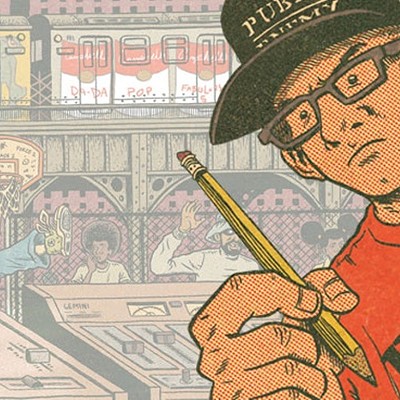Cass McCombs thinks we should all be reading more poetry.
"The poetry section in any bookstore is always the most neglected," he says. This is probably sage advice coming from a man who is both well acquainted with classic texts — some of his more obvious references are taken from the "Song of Solomon" and Baudelaire — and a poet in his own right. But if you're wondering where to start, you're on your own. "I find it hard to recommend things, because everyone has their own education, their own trip," he says. "I don't really feel comfortable being a teacher ... telling people how to think and live."
This sort of demurring is typical, though less a matter of modesty than the product of a clear sense of self. While he is hardly an interview-dodging recluse, nearly every profile of McCombs describes the singer-songwriter as some variation of "cagey," with a reticence to discuss the meaning behind his songs, or to follow certain ingrained conversational expectations; for instance, he allows for sometimes awkwardly long pauses and rarely uses verbal filler.
As a result, it's tempting to mythologize McCombs as some sort of riddle-speaking, Dylan-esque representation of the Old Weird America. McCombs, for his part, is barely aware of this stock music-journalism characterization. "I don't read my clips, but I do talk to people, like now. Right now," he says, with a light laugh. "But to hear that is at least somewhat bizarre because I feel like I'm being pretty straight up." In other words, what some seem to interpret as slightly craggy antagonism is just thoughtfulness. "Perhaps in this world of deception and lies, people are just naturally suspicious of everybody, you know?" he muses. "I think I am. I have my moments of, you know, flashbacks, acid paranoia"
McCombs' dry sense of humor — along with a general weirdo-country-psych-rock sensibility — makes him a fitting tour-mate for the Meat Puppets, with whom he recorded a split 7-inch, to be released later this month. (McCombs contributed two new tracks, while the Puppets covered "Cathy's Clown" and "(Hey Baby) Que Paso.")
McCombs dislikes the word "fan." ("It just sounds ... demeaning? As if [it's] a follower, some kind of sheep and not an autonomous, enlightened individual.") But he counts the Meat Puppets, and Curt Kirkwood's guitar playing in particular, as influences: "Coming from the West, that was a huge part of our musical education," he recalls. "The SST music, the Meat Puppets and Minutemen, it just cross-references so many different styles."
A Californian by birth, now living in New York, McCombs has rarely stayed in one place for very long, which gives him the romantic air of a traveling troubadour. He's extremely prolific, having released seven records over the last decade — most recently last year's strange and sprawling 22-track double record, Big Wheel and Others. It's is an unwieldy collection of songs, jumping from country-rock trucker anthems and spooky, low-key murder ballads, to (in one case) an odd Karate-esque indie-jazz interlude. Sometimes the songs are funny and sometimes they're wrenching, and sometimes they're wrenching until you realize you've missed the joke.
Big Wheel and Others is loosely tied together with clips from Ralph Arlyck's 1970 documentary short "Sean," a collection of interviews with the 4-year-old son of San Francisco hippies. These can be a bit unsettling (in the first clip, Sean talks gleefully about smoking pot), though they're not necessarily meant to be.
"We wanted to give [Big Wheel] the expanse that you're allowed on a double record," says McCombs, "not just making it a conveyer belt of songs, but breaking it up with sound clips, like a Wu Tang record." The interviews, McCombs felt, matched the tone of songs, but there was more to it than that. "Sean is attempting to explain what he sees as the world, and a lot of what he says is hilarious and a lot of what he says is mundane because he's repeating what he hears adults say," he says. "I think all of us do that. A lot of what we think we're thinking is just what someone else told us to think. And I think that's a fact. I don't think you can really avoid that."
Not everything on Big Wheel works and, on the whole, it's not as consistently successful or cohesive as earlier efforts like Humor Risk and Wit's End (which were released just seven months apart). But few modern songwriters seem to approach songwriting with less calculation — it's easy to imagine that songs are spilling effortlessly out of McCombs at all times. Surely, one speculates, McCombs must possess an unusually strong sense of freedom, artistic and otherwise.
"No," McCombs says with a laugh. "I don't feel free. I don't. I mean, I try not to even think about my feelings on that level, whether or not I'm free or imprisoned by whatever ... mostly the songs I write ... they don't always necessarily come from a personal place. I don't need to express myself, completely. I gave up trying to do that. It's a useless desire. And it's kind of a delusional fantasy to expect that every song is a complete encapsulation of your entire spirit, you know?"














